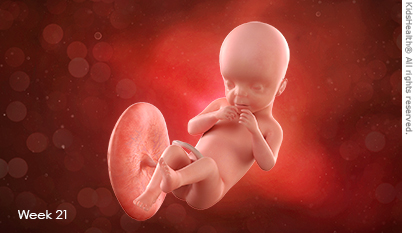- Home
- Humana Medicaid
- Kentucky Medicaid
- Medicaid extras
- Health and wellness
- Parents Home
- Para Padres
- A to Z Dictionary
- Allergy Center
- Asthma
- Cancer
- Diabetes
- Diseases & Conditions
- Doctors & Hospitals
- Emotions & Behavior
- First Aid & Safety
- Flu (Influenza)
- Food Allergies
- General Health
- Growth & Development
- Heart Health & Conditions
- Homework Help Center
- Infections
- Newborn Care
- Nutrition & Fitness
- Play & Learn
- Pregnancy Center
- Preventing Premature Birth
- Q&A
- School & Family Life
- Sports Medicine
- Teens Home
- Para Adolescentes
- Asthma
- Be Your Best Self
- Body & Skin Care
- Cancer
- Diabetes
- Diseases & Conditions
- Drugs & Alcohol
- Flu (Influenza)
- Homework Help
- Infections
- Managing Your Weight
- Medical Care 101
- Mental Health
- Nutrition & Fitness
- Q&A
- Safety & First Aid
- School, Jobs, & Friends
- Sexual Health
- Sports Medicine
- Stress & Coping
Pregnancy Calendar: Week 21
Your Baby's Development
The amniotic fluid that has cushioned and supported your baby now serves another purpose. The intestines have developed enough that small amounts of sugars can be absorbed from the amniotic fluid that your baby swallows and passed through the digestive system to the large bowel.
Almost all your baby's nourishment, though, still comes from you through the placenta.
Until now, your baby's liver and spleen have been responsible for making blood cells. But now the bone marrow spaces are developed enough to contribute to blood cell formation. Bone marrow will become the major site of that production in the third trimester and after birth. (The spleen will stop producing blood cells by week 30, and the liver will stop a few weeks before birth.)

Your Body
Is exercise safe during pregnancy? Exercise can be a great way to stay in shape during pregnancy and can even keep some problems — such as varicose veins, excessive weight gain, and backache — to a minimum.
But pregnancy is not the time to start training for a triathlon — going slowly is the name of the game. Because ligaments become more relaxed during pregnancy, you're at higher risk for injury, so low- or non-impact exercise such as yoga, swimming, and walking are your best bets. Talk to your health care provider before beginning any exercise program while you're pregnant.

© 1995- The Nemours Foundation. KidsHealth® is a registered trademark of The Nemours Foundation. All rights reserved.
Images sourced by The Nemours Foundation and Getty Images.

